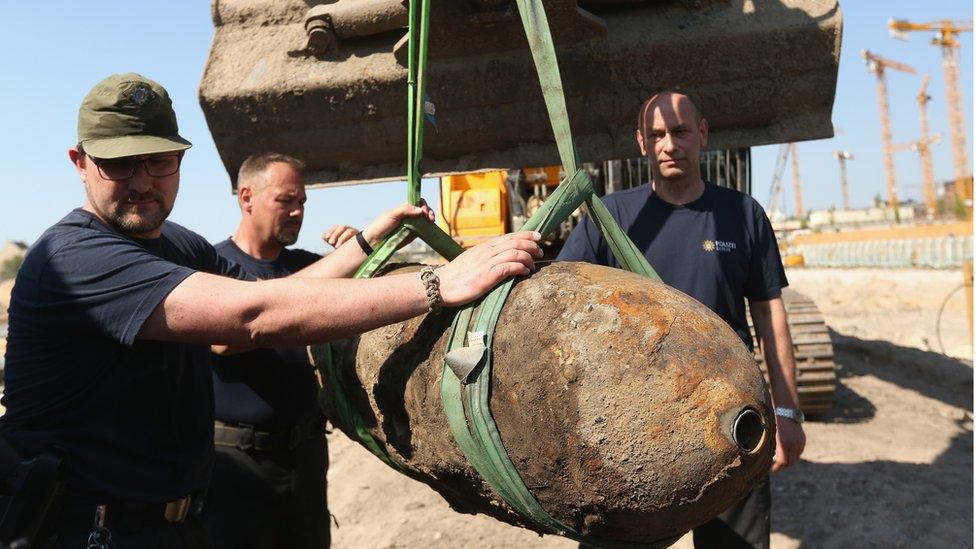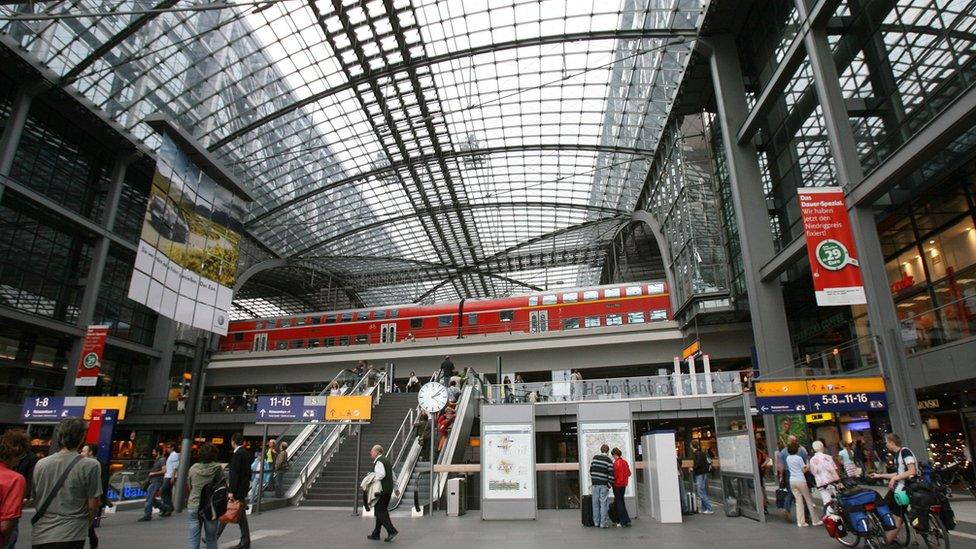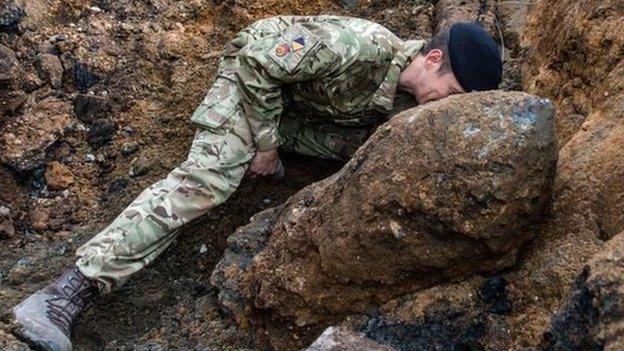Berlin police defuse WW2 bomb after mass evacuation
- Published
The bomb was found by workers on a construction site in Heidestrasse
German police have defused a World War Two bomb in central Berlin, after some 10,000 people were evacuated.
"A short bang - there was a controlled explosion of the detonator away from the bomb," the police said.
The British bomb has been removed, the main railway station has reopened and traffic is getting back to normal.
The evacuation zone included homes, government ministries, hospitals and museums. The disruption lasted from 09:00 to 13:30 (0700-1130 GMT).
During that period trains were unable to stop at the main railway station and vehicles were diverted away from the zone. The police cordon has now been lifted.
"Everything went smoothly without complications, and by the book," said police explosives expert Engin Laumer after the 500kg (1,100lb) bomb had been defused.

A big digger was used to hoist the bomb away once it was safe
It was found last Wednesday during construction work in Heidestrasse.
Buildings were cleared in an 800m (2,625ft) radius around the site. Police went door to door to check the area was empty of people before their specialist team began defusing the bomb.
Berlin's famous Charité university hospital and a military hospital were partly shut down.
Police tweeted a photo of their bomb disposal team poised to make it safe.
Allow X content?
This article contains content provided by X. We ask for your permission before anything is loaded, as they may be using cookies and other technologies. You may want to read X’s cookie policy, external and privacy policy, external before accepting. To view this content choose ‘accept and continue’.
Thousands of unexploded bombs from the 1939-45 war are found every year. Berlin was reduced to ruins in 1945 and about 3,000 unexploded bombs are believed to be still lying buried in the city.
In September about 65,000 people were evacuated in Frankfurt because of an unexploded bomb.

The evacuation zone included Berlin's Hauptbahnhof
Flights to and from Tegel airport - about 7km (4.5 miles) away - were not affected by the evacuation.
Tegel, which is Berlin's busiest airport, was briefly closed last August after the discovery of a Soviet World War Two bomb.

The menace of unexploded bombs
By Jenny Hill, BBC Berlin correspondent
Sitting in the warm sunshine, suitcases beside them, Gabrielle and her sister gazed at the police cordon stretched across the glass façade of Berlin's main railway station. "I hope it doesn't go off!" she laughed.
Like many Germans, Gabrielle was rather sanguine about the presence of unexploded ordnance. "They defuse World War Two bombs from time to time in Osnabrueck - my home town - too," she added.
The relics of wartime Germany turn up with surprising regularity. Estimates vary but it is thought that at least one in every 10 Allied bombs dropped on this country during World War Two failed to detonate.
They are discovered so frequently, often by builders or farmers, that every German state has a specialist team responsible for their disposal. But rarely do they cause such widespread disruption.

Other WW2 bombs discovered in Germany
May 2017: 50,000 people were evacuated from Hannover while three British-made bombs were defused
December 2016: More than 50,000 evacuated in Augsburg over 1.8-tonne British explosive
May 2015: 20,000 people in Cologne forced to leave their homes after a one-tonne bomb was discovered
January 2012: A construction worker was killed when his digger hit an unexploded bomb in Euskirchen
December 2011: 45,000 people were evacuated from Koblenz - half the total population - after two bombs were found in the riverbed of the Rhine
June 2010: Three members of a bomb disposal squad were killed in Goettingen during an operation to defuse a bomb found on a building site
- Published11 August 2015
